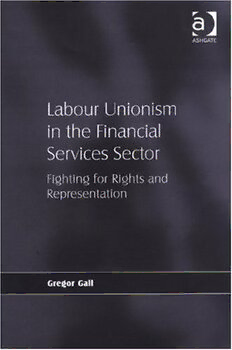
Labour Unionism in the Financial Services Sector PDF
223 Pages·2008·0.701 MB·English
Most books are stored in the elastic cloud where traffic is expensive. For this reason, we have a limit on daily download.
Preview Labour Unionism in the Financial Services Sector
Description:
In recent years, there has been an acute crisis of worker representation in the finance sector in the UK. Labour union and staff association membership has fallen, collective organisation has experienced dislocation and disorganisation and worker self-confidence has been sapped. Prior to this, there was a sense of an identifiable trajectory towards greater 'unionateness' by labour unions and staff associations, with the sector moving towards associations with the wider trade union movement, growing self-identification of employees as 'workers' and the use of traditional tools of collective bargaining such as threats of strikes and strikes themselves. The former set of outcomes have resulted from a particular type of labour unionism being overwhelmed by challenges from employers pursuing policies based on HRM, partnership and union exclusion on the one hand, and on the other, significant restructuring of the sector in terms of service providers and means of service/product delivery.The key explanation for this outcome has been the inability-cum-unwillingness of labour unionism, particularly independent labour unionism, to develop workplace unionism as a non-dependent resource, which would have, in turn, allowed labour unionism to be less susceptible to overtures and pressures from employers. This study documents and explains this trajectory in wider historical terms, providing invaluable insights reading both for those interested in the future of both the labour movement and the finance sector in particular.
See more
The list of books you might like
Most books are stored in the elastic cloud where traffic is expensive. For this reason, we have a limit on daily download.
